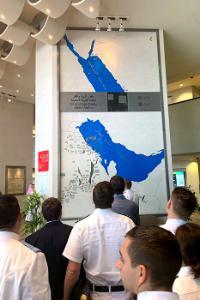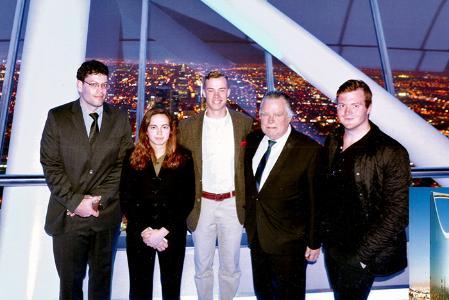Trip to Saudi Arabia Provides Glimpse of Modern, Ancient Ways

Cadets visiting Saudi Arabia in late November study a map of Aramco’s oil fields during a stop at that company’s security headquarters. —Photo courtesy of Maj. Jason Schroepfer.
In late November, three cadets and a faculty member took advantage of an unusual opportunity: an all-expenses-paid trip to Saudi Arabia.
Making the trip were Aiden Atchison ’20, Morgan Davis ’20, Sam Knapp ’20, and Maj. Jason Schroepfer, assistant professor of modern languages and cultures, plus three cadets and a faculty member from both the United States Military Academy and the Citadel.
The group’s travel was sponsored by the National Council of U.S.-Arab Relations (NCUSAR), a non-governmental organization whose mission is to improve American knowledge and understanding of the Arab world. The organization also happens to have close ties to VMI, as its founder and CEO is John Duke Anthony ’62.
As part of its mission, NCUSAR regularly offers travel opportunities geared toward cadets from the service academies and the six senior military colleges. In the spring, Schroepfer and another group of cadets traveled to Qatar courtesy of NCUSAR.
The trip to Saudi Arabia, Schroepfer explained, was meant to showcase that nation’s Vision 2030, which calls for economic diversification, a greater ability for young Saudi Arabians to earn degrees in their home nation, and more job opportunities for women.
The traveling Americans thus visited many places supporting this goal, including the King Abdulaziz City for Science and Technology, a government-sponsored center for scientific research that has a heavy focus on renewable energy, and the Moderation Center, which analyzes Twitter and other social media sites. “They’re targeting the ideology of terror,” Schroepfer explained.
The group also visited the main headquarters of Aramco, officially known as the Saudi Arabian Oil Company, which, with 2018 revenues of over $111 billion, is one of the most profitable companies in the world.
“We only visited the main buildings,” explained Davis, who plans to commission into the Marine Corps. “We didn’t get to go out into the oil fields.”
 Atchison, who will commission into the Army, was most impressed with the security at Aramco, which relies heavily on unmanned technologies such as drones and security cameras. It’s a level of security that’s definitely needed, he noted, as in September 2019 there was an attack on an Aramco oil processing facility, possibly originated from either Yemen or Iran.
Atchison, who will commission into the Army, was most impressed with the security at Aramco, which relies heavily on unmanned technologies such as drones and security cameras. It’s a level of security that’s definitely needed, he noted, as in September 2019 there was an attack on an Aramco oil processing facility, possibly originated from either Yemen or Iran.
“It’s very fascinating how they’ve cut corners and dealt with security issues,” said Atchison. “It’s the most wealthy company in the world. It was something else.”
The cadets noted that their trip included visits to a lot of military facilities. Knapp, who will commission into the Army, noted that the command structures of the Saudi military reminded him of the U.S. military. “That’s something you don’t see very often,” he stated.
“When you think about the Middle East, you don’t think of it as a very technologically advanced area,” said Davis. “Saudi Arabia definitely surprised me with their military bases.”
Atchison agreed, saying, “We saw a lot more things than we probably should have with the war in Yemen. They thought we were more important than we were.”
They were important enough to be protected by armed guards everywhere they went, all of whom spoke only Arabic—a situation that gave the cadets studying Arabic a chance to practice their language skills. Everyone else they encountered, the cadets reported, spoke English fluently.
Davis, who is double majoring in international studies and modern languages (Arabic), noted that the split between Arabic speakers and English speakers among their group put her in somewhat of a unique position.
“I don’t think [the guards] knew I could understand everything they were saying in the car,” she commented.
The guards also offered a kind of back-door access that most tourists don’t get, including a stop at an open-air market. “It was very good to see not only what they show upfront, but also what’s in the dark alleyways,” said Atchison.
Atchison didn’t have to travel to a dark alleyway, though, to see the strange juxtapositions that life in Saudi Arabia provides.
“At the airport, someone was telling us how technologically advanced the country was,” he said. “Then, at the same time, someone drove by in this truck with a bunch of goats in the back of it.”
Throughout their trip, the cadets enjoyed the chance to get to know their counterparts from West Point and the Citadel. Atchison, who is earning a minor in modern languages (Arabic), noted that one of the West Point cadets knew a good bit of Arabic.
“It was very good to sit down and talk with him about his experiences,” said Atchison. “We’re all ending up in the same place pretty much.”
Davis, meanwhile, had an even closer connection to the report. One of her best friends goes to West Point, and one of the West Point cadets on the trip knew that friend quite well.
“It’s a very small world,” said Davis. “We’re all pretty connected, whether we know it or not.”
- By Mary Price
.svg)
.png)